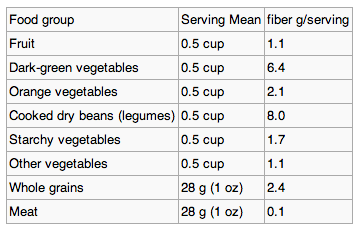About[]
Dietary fiber is a carbohydrate (or a polysaccharide) that is incompletely absorbed in humans and in some animals. Like all carbohydrates, when it is metabolized it can produce four Calories (kilocalories) of energy per gram.

However, in most circumstances it accounts for less than that because of its limited absorption and digestibility. Dietary fiber consists mainly of cellulose, a large carbohydrate polymer that is indigestible because humans do not have the required enzymes to disassemble it. There are two subcategories: soluble and insoluble fiber. Whole grains, fruits (especially plums, prunes, and figs), and vegetables are good sources of dietary fiber. There are many health benefits of a high-fiber diet. Dietary fiber helps reduce the chance of gastrointestinal problems such as constipation and diarrhea by increasing the weight and size of stool and softening it. Insoluble fiber, found in whole wheat flour, nuts and vegetables, especially stimulates peristalsis – the rhythmic muscular contractions of the intestines which move digesta along the digestive tract.
Soluble fiber, found in oats, peas, beans, and many fruits, dissolves in water in the intestinal tract to produce a gel which slows the movement of food through the intestines. This may help lower blood glucose levels because it can slow the absorption of sugar. Additionally, fiber, perhaps especially that from whole grains, is thought to possibly help lessen insulin spikes, and therefore reduce the risk of type 2 diabetes. The link between increased fiber consumption and a decreased risk of colorectal cancer is still uncertain.
Fiber Contents in Food[]

How Much Fiber Do You Need?[]
Children, teens and the elderly have varying dietary fiber needs, according to Colorado State University. Children between the ages of one and three need 19g of fiber daily and kids from four to eight should eat 25g per day.
Boys aged nine to 13, need 31g of daily fiber and girls of the same age need 26g. Teen boys, from the ages of 14 to 18, should consume 38g of fiber, the same as an adult male under the age of 50. Females from 14 to 18 need 26g. Pregnant females need 28g of dietary fiber daily and breastfeeding mothers need 29g.
Dietary fiber needs drop slightly for those over age 50, according to Colorado State University, Men over 50 need 30g per day and women over 50 need 21g.
Source: Livestrong